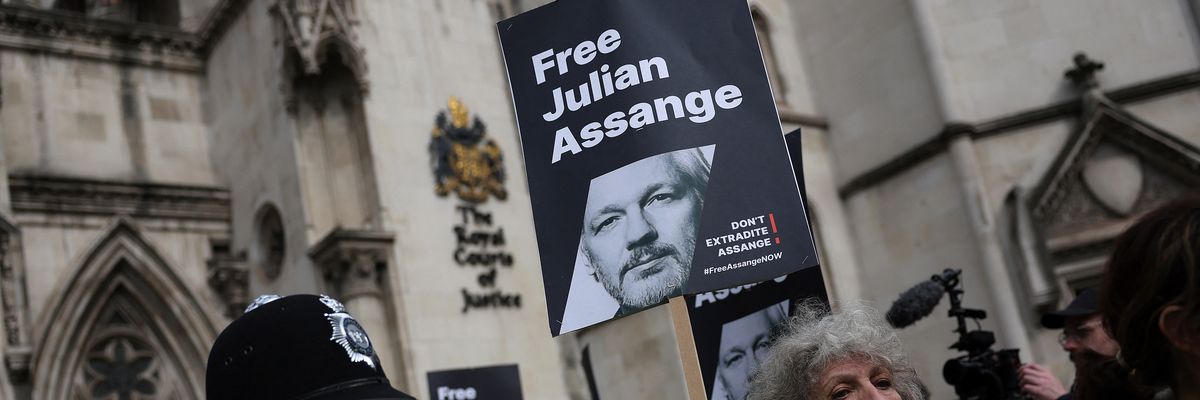The United Kingdom's High Court
ruled Tuesday that WikiLeaks founder Julian Assange cannot immediately be extradited to the United States and gave the Biden administration three weeks to provide "assurances" that the publisher's First Amendment rights will be protected and that he won't face the death penalty.
If the U.S. does not provide the requested assurances, Assange will be allowed to pursue a limited appeal of his extradition. Should the U.S. submit assurances by the April 16 deadline, a hearing will be held on May 20 to determine whether they are "satisfactory."
Assange, whose health has deteriorated badly during his five years in a high-security London jail, faces 17 counts of violating the Espionage Act and a possible 175-year prison sentence in the U.S. for publishing classified information—a
common journalistic practice. WikiLeaks disclosures exposed grave U.S. and U.K. war crimes in Iraq and Afghanistan.
Press freedom and human rights groups say the extradition of Assange to the U.S. would set a dangerous precedent and pose a dire threat to journalism everywhere.
Trevor Timm, executive director of the Freedom of the Press Foundation, said in a
statement Tuesday that "we are glad Julian Assange is not getting extradited today."
"But this legal battle is far from over, and the threat to journalists and the news media from the Espionage Act charges against Assange remains," said Timm. "Assange's conviction in American courts would create a dangerous precedent that the U.S. government can and will use against reporters of all stripes who expose its wrongdoing or embarrass it. The Biden administration should take the opportunity to drop this dangerous case once and for all."
"It's long past time for the U.S. Justice Department to abandon the Espionage Act charges and resolve this case."
The U.S., which has been aggressively pursuing Assange's extradition for years, previously provided the U.K. government with assurances that Assange would not be held at a supermax prison that's
notorious for its inhumane treatment of inmates.
Human rights groups have
said such assurances from the U.S. government are "inherently unreliable" and should not be taken seriously by British authorities.
"While the U.S. has allegedly assured the U.K. that it will not violate Assange's rights, we know from past cases that such 'guarantees' are deeply flawed—and the diplomatic assurances so far in the Assange case are riddled with loopholes," noted Simon Crowther, legal adviser at Amnesty International.
"The U.S. must stop its politically motivated prosecution of Assange, which puts Assange and media freedom at risk worldwide," Crowther said Tuesday. "In trying to imprison him, the U.S. is sending an unambiguous warning to publishers and journalists everywhere that they too could be targeted and that it is not safe for them to receive and publish classified material—even if doing so is in the public interest."
Jameel Jaffer, executive director of the Knight First Amendment Institute at Columbia University, echoed that message, saying in a statement that "prosecuting Assange for the publication of classified information would have profound implications for press freedom, because publishing classified information is what journalists and news organizations often need to do in order to expose wrongdoing by government."
"It's long past time for the U.S. Justice Department to abandon the Espionage Act charges and resolve this case," said Jaffer.
